Preparation Time: 30 minutes
Serves: 4
Ingredients:
| 2 | Cups | Rice, uncooked |
| 2 | Cups | Spinach, frozen |
| 1 | Small | Ginger |
| 2 | Cloves | |
| 2 | Sticks | Cinnamon |
| 4 | TBsp | Coriander & Cumin Powder |
| 1 | Tsp | Turmeric Powder |
| 1/4 | Tsp | Chili or Cayenne Pepper |
| Salt to Taste |
Directions:
- Wash rice finely and soak for an hour.
- Heat oil in a sauce pan and add cinnamon, cloves, onions, grated ginger, and chili and fry them.
- Add spinach and sauté for 2 minutes.
- Add rice and 6 cups of water.
- Add all of the spices and stir and mix them well.
- Stir frequently. Bring to a boil over a high heat. Then reduce the heat.
- Cover and cook for 10-12 minutes until rice is tender and liquid is absorbed.
- Serve it warm with chilled ratio.
Nutrition Facts are for 1/2 Serving.
One cup of spinach has nearly 20% of the RDA of dietary fiber, which aids in digestion, prevents constipation, maintains low blood sugar, and curbs overeating.
Cancer
Flavonoids — a phytonutrient with anti-cancer properties abundant in spinach — have been shown to slow down cell division in human stomach and skin cancer cells. Furthermore, spinach has shown significant protection against the occurrence of aggressive prostate cancer.
Anti-Inflammatory
Neoxanthin and violaxanthin are two anti-inflammatory epoxyxanthophylls that play an important role in regulation of inflammation and are present in unusual amounts in spinach.
Antioxidants
The vitamin C, vitamin E, beta-carotene, manganese, zinc and selenium present in spinach all serve as powerful antioxidants that combat the onset of osteoporosis, atherosclerosis and high blood pressure.
By inhibiting the angiotensin I-converting enzyme, peptides within spinach have been shown to effectively lower blood pressure.
Vision
Both antioxidants lutein and zeaxanthin are especially plentiful in spinach and protect the eye from cataracts and age-related macular degeneration.
Immunity
One cup of spinach contains over 337% of the RDA of vitamin A that not only protects and strengthens “entry points” into the human body, such as mucous membranes, respiratory, urinary and intestinal tracts, but is also a key component of lymphocytes (or white blood cells) that fight infection.
Skin
The high amount of vitamin A in spinach also promotes healthy skin by allowing for proper moisture retention in the epidermis, thus fighting psoriasis, keratinization, acne and even wrinkles.
Bones
One cup of boiled spinach provides over 1000% of the RDA of vitamin K that can prevent excess activation of osteoclasts (the cells that break down bones), as well as promote the synthesis of osteocalcin, the protein that is essential for maintaining the strength and density of our bones.
Calcification
Vitamin K is a crucial component of the process called carboxylation, which produces the matrix Gla protein that directly prevents calcium from forming in tissue. Eating one cup of spinach contributes to this process that fights atherosclerosis, cardiovascular disease and stroke.
Brain and Nervous Function
The abundance of vitamin K in spinach contributes greatly to a healthy nervous system and brain function by providing an essential part for the synthesis of sphingolipids, the crucial fat that makes up the Myelin sheath around our nerves.
Let me know what you think by leaving a comment below! I love to hear from my readers!


